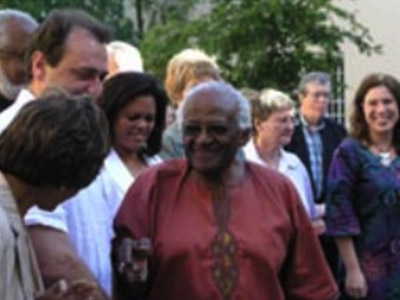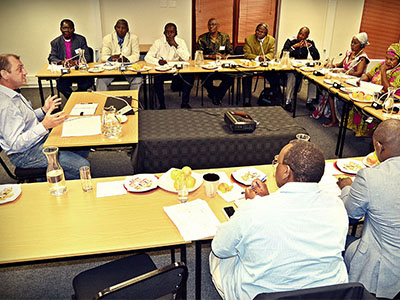Our Story
Our Story
Building Fair, Democratic and Inclusive Societies in Africa
About the IJR
About the IJR
The Institute for Justice and Reconciliation (IJR) was launched in 2000 in the wake of the public hearings of South Africa’s Truth and Reconciliation Commission (TRC). Today, the IJR works towards its broadened vision of building fair, inclusive, democratic and peaceful societies in Africa, and increasingly further abroad, by designing relevant and carefully crafted interventions that combine research, dialogue, capacity-building, advocacy, policy advice and implementation support. We pursue this vision at the global, continental, regional and national levels.
Our Story | Overview of IJR’s 20 year journey | Remembering Stan Henkeman
The IJR is instituted
As the TRC ended its sombre proceedings, the world had witnessed details about one of the worst human rights violations. The unjust patterns of the apartheid regime were evident and there was a need for individual and collective actions to redress inequality. As a result, the IJR was instituted on 10 May 2000, with only five staff members, devoted to furthering the work of the TRC. In the same year, it established the community-healing project, which created spaces to reflect on the history of oppression while empowering Africans towards the direction of active citizenship.
The next step
The next step was aimed at understanding the citizens’ perceptions on social issues and their prospects for the future, which gave birth to the South African Reconciliation Barometer in 2002. By 2003, the Institute had extended its reach to Angola, the DRC, Rwanda, Sierra Leone, the Sudan and Zimbabwe. In the following year, the Transformation Audit, which measures economic transformation in South Africa was launched as well as the annual Ashley Kriel Memorial Lecture.
The IJR receives UNESCO Prize for Peace Education
In 2006, IJR hosted a national conference themed, ‘A National Priority? TRC Recommendations and the Need for Redress’. Due to its undeniable footprint in the continent, the IJR received the UNESCO Prize for Peace Education in 2008. The award inspired the Institute to intensify its work around advocacy and transformation to the point that in 2009, we uncovered the experiences of women who lived through the conflict in South Sudan. It led to the creation of the book, With Pain, Hope and Patience: The Lives of Women in South Sudan came at a time there was gap in literature and research documenting gender issues in Sudan.
In an effort to establish justice mechanisms ‘from the bottom up”, the IJR with the Congolese Coalition for Transitional Justice (CCJT) hosted a policy seminar in 2010 in Kinshasa. It provided a platform for government and grassroots structures to develop fresh judicial strategies. In 2012, the IJR became a Core partner of the Afrobarometer network to further the research and understanding of socio-economic conditions that affect the public.
The IJR expands its reach
IJR extended on the notions of the Pan-African Principles for Truth Commissions report by presenting an inclusive approach towards peace and stability in 2015 at Burundi, the eastern DRC and Rwanda. IJR has now expanded its reach to the Republic of Korea, Sri Lanka, Myanmar, Iraq, Afghanistan, Palestine and Northern Ireland. Our thought provoking team is committed to dismantling colonial legacies through Justice and Peacebuilding, Research and Policy, Sustained Dialogues, Communication, Advocacy and Strategy programmes.
The IJR today
We continue to host the Annual Reconciliation Awards to individuals and organisations that contribute towards nation building in South Africa. The recipients of the awards include the Socio-Economic Rights Institute, the community of Masiphumelele, PJ Powers and Sibongile Khumalo, Shine Centre, the Ruben Richards Foundation, to name a few. As our patron Desmond Tutu once said, “IJR’s impact across the continent [is of] hope for our future. Someday we will realise our dream of a fair, democratic and inclusive Africa!”
Overview of IJR’s 20 year journey
Overview of IJR’s 20 year journey
Launched in 2000, the IJR celebrated 20 years of its existence in 2000 and marked this milestone by hosting events that not only highlighted its achievements but also reflected on some of the challenges it has encountered over the years. These events also acknowledged and thanked all the key stakeholders, past and present, who have partnered with the IJR.
20th Anniversary message from our previous Executive Director, Stan Henkeman
The year 2020 was also significant on multiple levels for South Africa’s post-apartheid journey. It followed on a year that marked 25 years of freedom as well as the 18 years since the end of the Truth and Reconciliation Commission (TRC – originally set to run from 1995 – 1998 but was extended to 2002). While 1994 marked the dismantling of the Apartheid political structure, the TRC in 1996 marked a coming to terms with the social aspect of apartheid’s impact on its citizens and was seen as essential for the nation-building.
For the past 20 years, therefore, the IJR has been at the centre of that journey of facing the past and nation-building, as it attempted to ensure that lessons from our Apartheid past were not repeated and that South Africa moved forward.
Remembering Stan Henkeman
Remembering Stan Henkeman



Stan we crossed paths during Ubuntulab cohort 3. Your wisdom and your humanity were evident. Go well in your next journey.
Stan we crossed paths during Ubuntulab cohort 3. Your wisdom and your humanity were evident. Go well in your next journey.
My innige meegevoel met Stan se heengaan! Sy lewe was exemplary & inspirational!’
Kindly as you get in touch with Fidi send my regards and let her know that she and her team of IJR and the family of the late Stan are in my deepest heart and thinking about them.
I am shocked upon hearing the untimely Departure of Stan Executive Director of IJR may his soul rest in peace 🙏🏻
Stan is for me one of the best examples of a life in service of a just peace. It lived in his smile and his unfailing goodwill. His passing leaves us so much poorer …
What a great tree that fell today. Stan was a real mensch. One of the nicest people I knew. I mourn with the IJR.
What a sad day for all of you at the IJR with the passing of Stan Henkeman. I can’t believe it.’
Please accept my deepest condolences IJR Family. It is sad news to hear or even process. Stan’s heart was larger than life – one of reconciliation and selfless service to people. May his legacy will live on.
In all these years you were the epitome of calmness and reason. Thank you for all that you were and for your contribution to our country. It is a better place because of you. Journey well my friend. You left your mark. May God place comfort in the hearts of your loved ones.





















